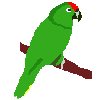Yesterday the Parrot met me
And his noisy manner set me
Thinking he was bent on bluffing,
Being nervous to the core. 1
When I asked him of the greeting,
Cheer on cheer, the Glasgow meeting
Gave to “Joe”, 2 he started screaming
That “YOUR FOOD WILL COST YOU MORE.”
“Bird”, I said, “restrain your squawking;
Let us drop to plainer talking.
Can you tell me why the workmen
Cheered for ‘Joe’ with loud ‘hurroar’?
Did they think he preached starvation
For the poor throughout the nation?”
But the bird in milder manner
Said “Your food will cost you more.”
“He began”, I said, “by giving
Proof to show the cost of living
Would not be one penny dearer
Than it ever was before. 3
Why, instead of growing steeper,
Living will, in fact, be cheaper!”
But his whisper still persisted
That “Your food will cost you more.”
Then in wrath I cried, “You duffer!
You conceited, fatuous bluffer!
Do you dare these simple statements
To consistently ignore?
Can’t you clear your silly noddle
Of this stupid catchword twaddle!”
Yet it seemed his beak still faltered
That “––– ––– ––– ––– ––– more.”
The Parrot is nervous because it knows that it has no answer to the questions it is about to face.
2Between October 1903 and January 1904, Chamberlain toured the country, delivering speeches in all the major industrial and commercial centres: Greenock, Leeds, Newcastle, Liverpool, Birmingham, Cardiff, and the City of London. He began with a speech at St Andrew’s Hall, Glasgow, on 6 October, before a capacity audience of 5,000: both the Times and the Daily Express reported that applications were made for 70,000 tickets and demand on the day was so high that, according to the Times’s correspondent, prices ranging from 5 shillings to 3 guineas (according to the position of the seats) were being paid for tickets that had been issued without charge. Chamberlain received a standing ovation when he entered the hall and another when he rose to speak.
3It is a mistake to say that he began by giving such a proof. In a speech that occupied five full columns in the Times, the first reference to the effects of the “tax on food” occurs near the foot of the fourth column. If the author of The Parrot actually read the speech, he may have been confused by Chamberlain’s description of his proposals as “my opening declaration”, though he clearly meant by this the opening declaration of his campaign. But more probably the poet relied on the report in the Express, which outlined Chamberlain’s proposals first, even though they came late in the speech, before reporting the earlier two-thirds of the speech.

